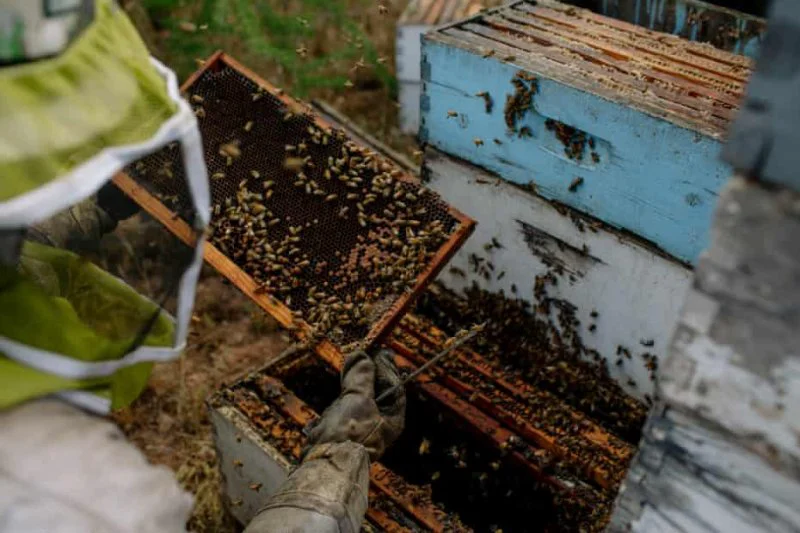US honeybee boom: ‘Not only are they not in decline or endangered, their increase in numbers may be responsible for declines in other bee populations’
US honeybee boom: ‘Not only are they not in decline or endangered, their increase in numbers may be responsible for declines in other bee populations’


Today, more than 2.98 million honeybee colonies are currently registered in the United States, according to the US Department of Agriculture — up from 2.35 million colonies in 2002.
But Andrew Coté, president of the New York City Beekeepers Association, said the fear of a honeybee apocalypse is misplaced.
“We are not headed for a world without bees,” he told The Post. “But it’s more titillating to shout that the sky is falling than to understand the real story.”
Not only are honeybees not endangered, they may be responsible for declines in other bee populations.
There are just 4,000 bee species native to North America (out of 20,000 globally), and the European honeybee isn’t one of them. They were first brought to this continent in the 17th century and quickly became an essential livestock, with beeswax a major export and honey used to make everything from sweetener to medicine to cement.
The problem, said [entomologist Manu] Saunders, is that their presence “could be harming wild insects in many places. Increasing numbers of honeybees may be depleting resources that wild insects need, spreading parasites and diseases to wild insects.”
This is an excerpt. Read the original post here.

 | Videos | More... |

Video: Nuclear energy will destroy us? Global warming is an existential threat? Chemicals are massacring bees? Donate to the Green Industrial Complex!
 | Bees & Pollinators | More... |

GLP podcast: Science journalism is a mess. Here’s how to fix it

Mosquito massacre: Can we safely tackle malaria with a CRISPR gene drive?

Are we facing an ‘Insect Apocalypse’ caused by ‘intensive, industrial’ farming and agricultural chemicals? The media say yes; Science says ‘no’
 | Infographics | More... |

Infographic: Global regulatory and health research agencies on whether glyphosate causes cancer
 | GMO FAQs | More... |

Why is there controversy over GMO foods but not GMO drugs?

How are GMOs labeled around the world?

How does genetic engineering differ from conventional breeding?
 | GLP Profiles | More... |

Alex Jones: Right-wing conspiracy theorist stokes fear of GMOs, pesticides to sell ‘health supplements’




 Viewpoint — Fact checking MAHA mythmakers: How wellness influencers and RFK, Jr. undermine American science and health
Viewpoint — Fact checking MAHA mythmakers: How wellness influencers and RFK, Jr. undermine American science and health Viewpoint: Video — Big Solar is gobbling up productive agricultural land and hurting farmers yet providing little energy or sustainabilty gains
Viewpoint: Video — Big Solar is gobbling up productive agricultural land and hurting farmers yet providing little energy or sustainabilty gains Trust issues: What happens when therapists use ChatGPT?
Trust issues: What happens when therapists use ChatGPT? Fighting deforestation with CO2: Biotechnology breakthrough creates sustainable palm oil alternative for cosmetics
Fighting deforestation with CO2: Biotechnology breakthrough creates sustainable palm oil alternative for cosmetics California, Washington, Oregon forge immunization alliance to safeguard vaccine access against federal undermining
California, Washington, Oregon forge immunization alliance to safeguard vaccine access against federal undermining 30-year-old tomato line shows genetic resistance to devastating virus
30-year-old tomato line shows genetic resistance to devastating virus The free-range chicken dilemma: Better for birds, but with substantial costs
The free-range chicken dilemma: Better for birds, but with substantial costs ‘You have to treat the brain first’: Rethinking chronic pain with Sanjay Gupta
‘You have to treat the brain first’: Rethinking chronic pain with Sanjay Gupta
